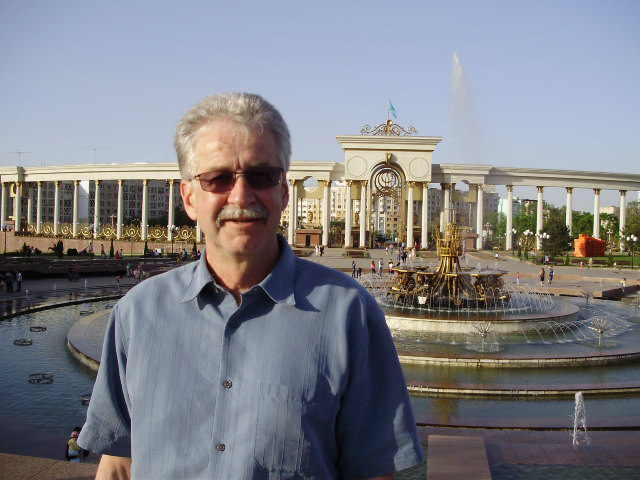by: Altynay Aitbayeva
KazNU Student
I interviewed Michael Brown – Professor, Director of Graduate Studies Communication and Journalism, University of Wyoming who had doing lecture from may of 12th to 26th in faculty of journalism at al-Farabi KazNU.
 – Why did you make a decision to be journalist?
– Why did you make a decision to be journalist?
– My decision to be a journalist began when I was in high school. I helped a couple ‘disk jockeys’ with their work. A disk jockey was the name given to radio announcers who played recorded popular music. I was fascinated with the power of radio to influence so many people. I studied radio in college and worked briefly in the radio industry in the US. Most of my radio work is done as an independent producer. My most recent work includes a series of documentaries about the role of music in different American communities.
– Can you say your idols in journalism?
– In American radio journalism I admire a journalist from the 1950s and 1960s named Edward R. Murrow. He was a particularly good radio reporter. He did extensive research, was fair about the topics he examined, his reports led to important social change, and he was not afraid to challenge powerful leaders. Many American journalists consider Edward R. Murrow an important role model.
– How do you imagine the future of traditional mass media?
– The mass media are experiencing a great deal of change. In the US, traditional media are changing as new social media become more important. The change will be primarily because of the technology that people use to access media. Most people access media using mobile devices such as smart phones, tablets, and computers. However, there is still a need for the good media content that journalists provide. The challenge for journalists is learning to adapt their content to the different new social media being used today.
– How can you evaluate 21st century journalism?
– That is a difficult question. Journalism will be evaluated based on whether it continues to be important in people’s lives. Journalism needs to take the lead in presenting credible information and editorial content to audiences using new media resources. You are the generation that will determine how this happens.
– What do you evaluate the methods of education in journalism faculty?
– It is hard for me to evaluate the methods. We represent different cultures and different education traditions. However, we share the common goal of preparing our students for the opportunities ahead of them, and we want them to succeed.
– What differences did you remarked? (With your methods)
– My teaching style involves strongly interacting with students. I don’t want students to simply listen to me, I want students to talk with me. Students have good ideas about being journalists, and I want to know what they think about today’s media. There are a few language barriers because some students know English better than others, but I find these interactions valuable. I learn about Kazakhstan and it shows me that Kazakh students can be curious and smart.
– You were in Kazakhstan. Are you impressed?
– This is my second visit to KazNU. I enjoy interacting with both the professors and students. One professor helped me learn to speak some Kazakh phrases. Some students took me to their favorite Kazakh restaurants, and I had a chance to visit both Astana and Karaganda. I am impressed with the quality of education in Kazakhstan and the character of the people.
– Do you have the favorite place in Almaty?
– I had an opportunity to visit the mountains while I was here. I grew up in a small town that is placed near mountains like Almaty. It reminded me of my own home in Wyoming. That was my favorite place. I was also impressed by the number of parks in Almaty, and the presidential park was quite nice to visit.
– What can you say about your visit to Kazakhstan in general?
– Kazakhstan is an interesting country. It is still a new country but is doing a good job of establishing a unique Kazakh identity, and journalists play an important role. The people are friendly and I felt quite welcome here. Kazakhstan and my home state of Wyoming share a horse culture, open plains, and substantial income from energy reserves and minerals. There are quite a few similarities between the two places. Because of this I expect Kazakhstan to continue to be a significant leader in Central Asia and beyond.











